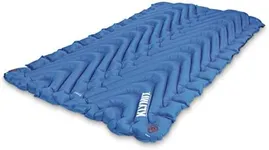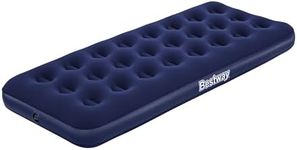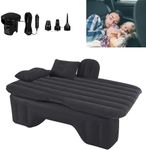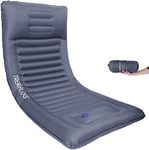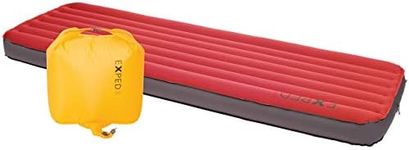Buying Guide for the Best Car Camping Mattress
Choosing the right car camping mattress can significantly enhance your outdoor experience by providing comfort and a good night's sleep. When selecting a mattress, consider factors such as size, thickness, material, insulation, and ease of use. Understanding these key specifications will help you find a mattress that meets your needs and ensures you wake up refreshed and ready for your adventures.SizeThe size of the mattress is crucial because it needs to fit both your car and your body comfortably. Mattresses come in various sizes, such as single, double, and even custom sizes to fit specific car models. If you are camping alone, a single mattress might be sufficient, but if you are sharing the space, a double mattress would be more appropriate. Measure the available space in your car and consider your sleeping preferences to choose the right size.
ThicknessThickness determines the level of comfort and support the mattress provides. Thicker mattresses (4 inches or more) offer more cushioning and are ideal for those who prefer a softer sleeping surface or have back issues. Thinner mattresses (2-3 inches) are more compact and easier to store but may not provide as much comfort. Consider your comfort needs and storage space when selecting the thickness of your mattress.
MaterialThe material of the mattress affects its durability, comfort, and insulation. Common materials include foam, air, and self-inflating mattresses. Foam mattresses are durable and provide good insulation but can be bulky. Air mattresses are lightweight and compact but may require a pump and can be prone to punctures. Self-inflating mattresses offer a balance between comfort and convenience. Choose a material based on your comfort preferences, ease of use, and the conditions you will be camping in.
InsulationInsulation is important for maintaining warmth, especially in colder weather. Some mattresses have built-in insulation or reflective layers to retain body heat. The R-value is a measure of insulation; higher R-values indicate better insulation. For summer camping, an R-value of 1-2 is sufficient, while for colder conditions, look for an R-value of 3 or higher. Consider the typical weather conditions of your camping trips to choose the appropriate level of insulation.
Ease of UseEase of use includes how quickly and easily the mattress can be set up, packed away, and maintained. Self-inflating mattresses are convenient as they require minimal effort to set up. Air mattresses may need a pump, which can add to the setup time. Foam mattresses are straightforward but can be bulky to transport. Consider how much time and effort you are willing to spend on setting up and packing away your mattress when making your choice.





